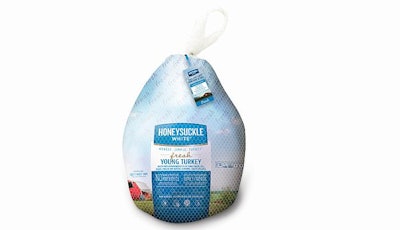
Don Steen and Lauren Arbogast are two distinctly different people.
Steen is a contract turkey grower in Missouri. Arbogast is a contract broiler farmer in Virginia.
Steen, a generation older than Arbogast, is a lifelong farmer who has picked up his mail in the same box for his entire life. In addition to his work as a farmer, he also farmed at the same time he served as the director of the Missouri Department of Agriculture. Arbogast had virtually no prior agricultural experience until marrying a farmer.
Yet the two have a very common bond. They love what they do, they are proud of what they do, and they are firm believers in transparency to help provide consumers an accurate message of what poultry farmers do and instill confidence in the industry.
The two were panelists during the session, “Food Transparency Today: A Dialogue with the Poultry Industry,” held March 3 at the Annual Meat Conference in Dallas, Texas.

Broiler farmer Lauren Arbogast, left, and turkey farmer Don Steen discuss their experiences with transparency in poultry production at the 2019 Annual Meat Conference. (Roy Graber)
Techniques in transparency
Arbogast, in addition to her work on the farm, is a school teacher. Her family has opened up the farm to field trips, and she also writes a farm blog on her “Paint the Town Ag” website.
She hears and reads a wide variety of questions, and it is important to her that those questions are answered, because it wasn’t that long ago that she was wondering the same things.
“Transparency is important to me,” she said. “It was very much an overlay of cultures, in essence, when I married onto the farm. I had to figure this out, and as I figured it out, I wanted to share it with others.”
Whenever possible, she makes sure it is a two-way conversation and the dialogue continues.
“I’m going for that relationship. Longevity is the greatest convincer. To me, it’s not just a tweet or a comment back and forth,” Arbogast said.
For Steen, it was his background in government work that helped him gain the appreciation for agriculture.
“I’ve been in Jefferson City at the capital for many years in the past. Policy was important to me. Less than two percent of the population live on the farm. It’s important for us, (because) they are so far from the farm, that we educate the people on what farming’s about,” he said. “It’s important for us to get that message out to the people who aren’t familiar with farming at all, who we are. They may look to a lot of us as factories, and that is just a concept that’s been pushed by people who are uninterested in animal agriculture.”
Like Arbogast, Steen has opened his farm up to visitors in the past. He was always a popular subject with the news media prior to Thanksgiving. While he welcomed the opportunity to educate others about turkey production, he does less on-the-farm educating because of biosecurity concerns.
But Steen helps educate the public about farming in another way, as one of the producers of Cargill brand Honeysuckle White’s traceable turkeys. Through the traceable turkeys, consumers can see a code on the packaging, input that code in a computer and see pictures of Steen, his farm and his turkeys.
“The fact that they put my face with that turkey … I’m proud of the fact that they know where that turkey came from,” he said.
Risks and precautions
There is a certain level of risk involved in transparency. Steen admitted that after years at the Missouri State Capitol, he is a bit cynical.
“I’m suspicious of everything anymore. I spent all those years in Jefferson City, Missouri, knowing there’s groups that are trying to put us out of business,” he said. “I don’t let people come on the farm and take pictures if I don’t know who they are. Even the people who come and load my turkeys, which is a Cargill crew, I’m careful to watch what they are doing.”
But Arbogast added: “The risk of being out there far outweighs any risk of not doing it. I think that is important for us to have those types of conversations.”

















